Teachers’ Perceptions Concerning the Characteristics of a Learning Environment Dedicated to Science Education
Abstract
The study of the disciplines from the Sciences area (Chemistry, Physics, Biology) is essential for handling the students with scientific concept, and equip students with the necessary skills with the view to produce an optimal adaptation to the specific requirements of knowledge based society related to the forming of positive attitudes towards science. To achieve such goals, it is very important for science teachers to create a suitable learning environment, enabling so the students to develop autonomy in their actions and thoughts, particularly to take control of their own learning. Only in an appropriate learning environment, students can capitalize in a maximal way their own learning experiences; they can form their skills of investigation, experimentation and abilities to operate independently and effectively in a given situation. The present paper is based on the analysis of the teachers’ perceptions concerning the characteristics that must be present in an optimal learning environment for sciences. The analysis was performed in the frame of the European project called PROFILES, and involved teachers from secondary education who answered to a questionnaire survey. The questionnaire items were aimed directly to some features of the learning environment such as: use of the teaching student-centered philosophy, taking into account the prior students’ knowledge and skills, as well as the proposals of involving the students in lesson planning, promoting communication skills, guiding students on developing social dimension and questions about scientific issues, promoting their analytical thinking, promoting an effective collaborative learning etc.
Keywords: sciencelearning environmentstudent-centered paradigmscientific inquiryPROFILES project
Introduction
In the “PROFILES - Professional Reflection Oriented Focus on Inquiry-based Learning and
Programme for Physics, Chemistry and Biology teachers, which aims to promote reflection-based
instruction, with the declared objective of improving the students’ scientific culture. In this project, the
focus was mainly on promoting scientific and psycho-pedagogical competences of teachers, on
teaching through scientific investigation.
The study of the disciplines from the Sciences area (Chemistry, Physics, Biology) is essential for
handling the students with scientific concepts, and equip students with the necessary skills, with the
view to produce an optimal integration and adaptation to the specific requirements of knowledge based
society related to the forming of positive attitudes towards science in general.
To achieve such goals, it is very important for science teachers to value the student-centered
paradigm, and, in this perspective, to create a suitable learning environment, enabling the students to
develop a kind of autonomy in their actions and thoughts, particularly to take control of their own
learning. Only in an appropriate learning environment, students can capitalize in a maximal way their
own learning experiences; they can form their skills of investigation, experimentation and abilities,
with the view to operate independently and effectively in a given situation.
The student-centered paradigm “structures its approach depending on a characteristic of the
student- process and/or student - content relations, as opposed with traditional teacher-centered
genuine involvement of students, in both cognitive and practical levels. Student-centered teaching is
strongly associated with the constructivist theory, being focused on student activity-learning, rather
than on the work of professor-teaching. Typical questions that raised in the planning process of a
student-centered lessons are: What do I want students to learn?; Why I want students to learn?; What
students have already known?; How will I know (and students will know) that they learn?; What
difficulties the students will have?; How can I help students to overcome difficulties?. (Gorghiu, &
Drăghicescu, 2014).
The classroom learning environment is the educational framework, where the student can learn
effectively.
Learning environments are broader than some physical components. They will also include: the
characteristics of the learners, the goals for teaching and learning, the activities that will best support
learning, the assessment strategies that will best measure and drive learning, the culture that infuses the
learning environment (Bates, 2015).
The science teacher’s responsibility is to create such an optimal learning environment, dedicated to
Sciences, which enable learners to develop their independence in thought and action, to develop
creativity, communication competences, metacognitive competences and social competences, to
develop the decision-making and scientific argumentation competences, to manage their own learning
process. Teacher intervention is necessary, but it will be folded on the peculiarities of each group of
students and each student and will relate, in particular, the growing motivation for learning, by
formulating tasks marked by novelty and having an optimal difficulty, relevant assignments,
meaningful for students.
Methodology
The aim of the investigative approach, developed in the PROFILES project (http://www.profiles-
project.eu/, http://profiles.ssai.valahia.ro), in the beginning of the project, was to identify and analyze
the teachers’ perceptions concerning the characteristics of a learning environment dedicated to sciences
education, from two points of view: on the one hand the confidence of the teachers about certain
aspects of the learning environment, and on the other the emphasis to integrate such issues within the
program of professional development.
The questionnaire was applied to 100 Sciences teachers (Physics, Chemistry, Biology) who acted at
the lower and secondary school levels.
The items of the questionnaire were designed to obtain data about some important characteristics of
the classroom learning environment such as: using student-centered teaching methods, taking into
account the students' prior knowledge, attitudes and skills and the students' proposals in lesson
planning, promoting students communication skills, guiding students in developing questions about
scientific and social dimensions of the issues, promoting students' superior thinking, metacognitive
competences, promoting effective collaborative learning , promoting students' creative thinking.
The items were structured into two assessment scales, with four steps each, the first one concerning
the confidence of the teachers about certain aspects of the learning environment (
second regarding the emphasis for continuous professional development program, but also the need to
integrate such issues in professional development program (
was: 4 - very well, 3 - well, 2 - satisfactorily, 1 - do not know, and for the emphasis for CPD was: 4 -
very necessary, 3 - necessary, 2 - rather not, 1 - definitively not. (Holbrook, Rannikmäe, & Valdmann,
2014)
The processing of the results was mostly statistical, in correlation with the qualitative analysis,
based on the data gathered from discussions with the involved teachers.
In our study we chose - for presenting and analyzing -, five relevant items in the questionnaire and
we made a comparative analysis of the results, from the two mentioned points of view:
emphasis for CPD.
Results and discussions
The first of those items refers to the implementation of the students-centered teaching in the
classroom, which is a very important aspect of an optimal learning environment because it maximally
capitalizes all the cognitive, metacognitive, emotional resources of the students. In this perspective, the
student has the central role in the educational process and teacher became a guide, a facilitator.
From the analysis of the data obtained from this item (Fig. 1), we can observe that the results are
distributed to the right side of the scale, both in terms of confidence (well - 48 %, very well - 48 %) and
in terms of emphasis for CPD (necessary - 41 %, very necessary - 59%). The results demonstrate the
importance of student-centered teaching methods and teachers’ desire to learn more about how to
effectively use those methods in science lessons.
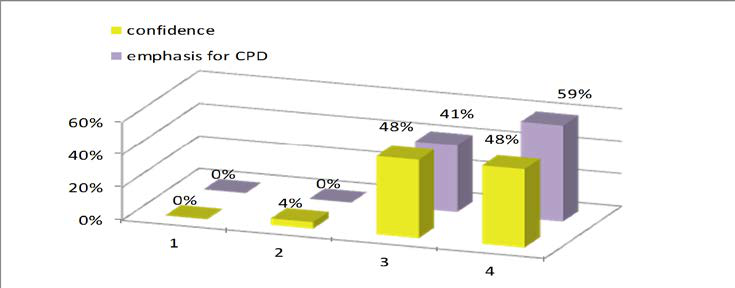
The second analyzed item refers to promoting students’ communication competences in a variety of
ways, both verbally and written. Acquiring communication competences regarding oral
communication, but also written and symbolic communication in order to express in a more efficient
manner the scientific ideas in a social context represents a very important objective of education
through science. The teachers’ responses confirm this idea (Fig. 2).
So, in the perception of the surveyed teachers, the confidence on promoting such competences in
classroom is good and very good (52 % and 40 %). Teachers consider necessary and very necessary to
integrate such subjects in a professional development program.
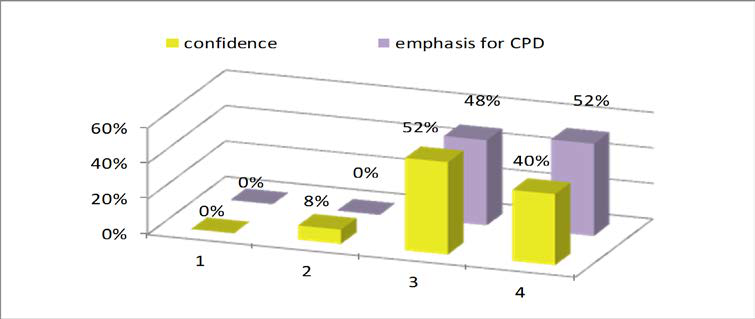
Another item selected refers to the promoting of students’ higher order thinking (analysis, synthesis,
evaluation). A very important aspect of student training is offered by the development of cognitive and
metacognitive competences. It is not enough for the students to have knowledge, they need to learn
how to use this knowledge, to make some connections, to use all thinking operations. Equally
important are the higher order strategies for selecting and monitoring mental operations, which enable
students to reflect on how they think and learn, to formulate learning objectives or performance to be
achieved, to select appropriate learning strategies or methods.
So, higher order thinking is a fundamental objective of students’ training, as it was confirmed by
research subjects’ responses (Fig. 3). At this item, we can identify an interesting aspect at the top of the
scale, where we observe that a very high percentage of respondents (59 %) consider very necessary to
approach such a subject in a future professional development program, which can lead us to the
conclusion that teachers sometimes feel poorly trained to create a learning environment in which they
can develop cognitive and metacognitive competences of students.
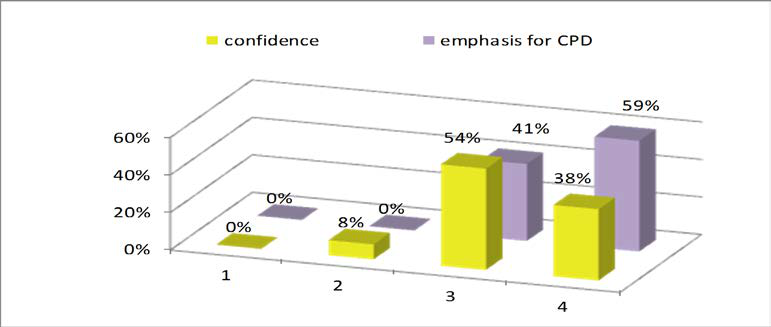
The next item of the questionnaire refers to the involvement of the students in learning through
group work of various types (experimental, discussions, role playing, debates). Working in group has
significant benefits for students: developing, implementing and communicating new ideas effectively,
openness and receptiveness to new and diverse perspectives, valuing the group ideas, originality,
perception of the failure as a learning opportunity.
Collaboration between students represents a fundamental aspect that characterizes an optimal
learning environment. At this item, the teachers’ responses are distributed in the positive side of the
scale, which show, on the one hand, the confidence in the development of such points in the classroom
and on the other hand, their desire to know more about streamlining collaboration between students
(information, teaching strategies etc.) (Fig. 4).
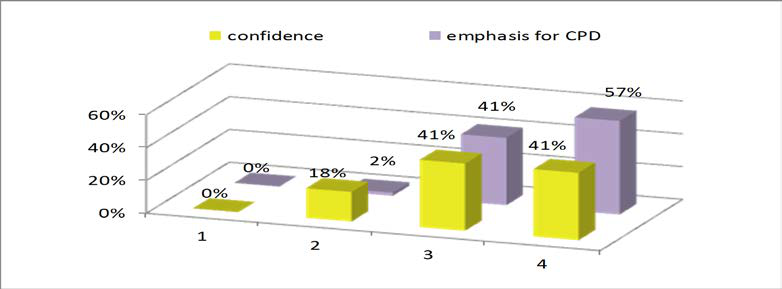
The last analyzed item of the study refers to promoting students’ argumentation skills for socio-
scientific decision-making.
Argumentation and decision making are very important issues in the study of sciences. Owning such
skills, students may present relevant and motivated points of view and may adopt justified decisions in
order to achieve set goals. This is demonstrated by the responses of surveyed teachers who need to be
trained about the ways in which students can develop such skills (Fig. 5).
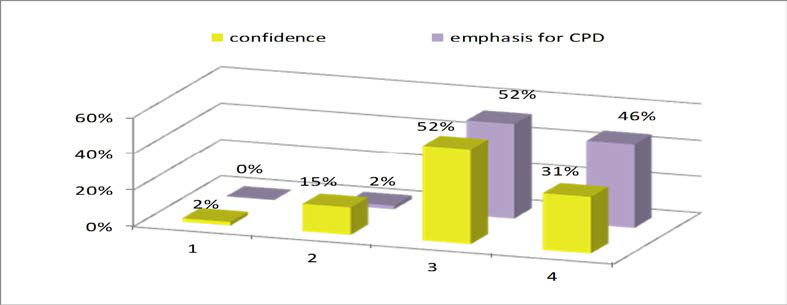
Conclusions
The results lead us to conclude that aspects related to the characteristics of an optimal learning
environment are considered important by teachers, but sometimes those issues are insufficiently valued
in the traditional manner of teaching Science, and requires a complex restructuring process. Teachers
sometimes feel poorly trained to develop to their students’ certain skills (communication skills,
collaborative learning, higher-order thinking, argumentation capacity, decision making), so they want
to know more about those issues, by participating to a continuous professional development program.
Just in an optimal learning environment, students can build their own knowledge, can learn how to
learn, they can use all their resources to learn effectively, to solve successfully all the important scholar
and social issues.
Acknowledgements
This work was funded through the Seventh Framework Programme “PROFILES - Professional
Reflection Oriented Focus on Inquiry-based Learning and Education through Science” No. 5.2.2.1 -
SiS-2010-2.2.1, Grant Agreement No. 266589, under the frame of: Supporting and coordinating actions
on innovative methods in Science education: teacher training on inquiry based teaching methods on a
large scale in Europe. The support offered by the European Commission in the fields of research and
innovation, through the project mentioned above, is gratefully acknowledged.
References
- Bates, A.W. (2015). What is a learning environment? https://opentextbc.ca/teachinginadigitalage/chapter/5-2what-is-a-learning-environment/ Gorghiu, G., & Drăghicescu, L. M. (coord.) (2014). Educaţie prin Ştiinţe. Aspecte referitoare la instruirea bazată pe investigaţie ştiinţifică. Târgovişte: Bibliotheca.
- Holbrook, J., Rannikmäe, M., & Valdmann, A. (2014). Identifying teacher needs for promoting Education through Science as a paradigm shift in Science Education. Science Education International, 25(2), 4-42.
- Noveanu, E. (2007). Centrare pe elev. Revista de pedagogie, 1-6, 17-20..
- http://inovatie.numeris.com.ro/Centrare%20pe%20elev.pdf
Copyright information

This work is licensed under a Creative Commons Attribution-NonCommercial-NoDerivatives 4.0 International License.
About this article
Publication Date
04 October 2016
Article Doi
eBook ISBN
978-1-80296-014-3
Publisher
Future Academy
Volume
15
Print ISBN (optional)
-
Edition Number
1st Edition
Pages
1-1115
Subjects
Communication, communication studies, social interaction, moral purpose of education, social purpose of education
Cite this article as:
Stăncescu, I., Petrescu, A. A., & Drăghicescu, L. M. (2016). Teachers’ Perceptions Concerning the Characteristics of a Learning Environment Dedicated to Science Education. In A. Sandu, T. Ciulei, & A. Frunza (Eds.), Logos Universality Mentality Education Novelty, vol 15. European Proceedings of Social and Behavioural Sciences (pp. 905-910). Future Academy. https://doi.org/10.15405/epsbs.2016.09.113

